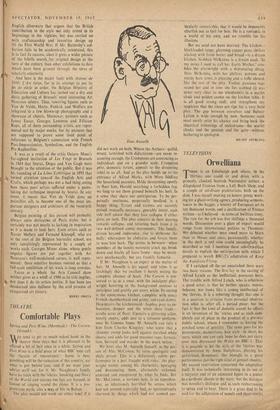T HEATRE
Comfortable Plays
WE tend to get so much naked hook in the theatre these days that it is pleasant to be offered a bit. of bait once in a• while. Spring and Port Wine is a bold piece of what BBC men call the Theatre of reassurance': home is best, gambling will be the ruination of this country, eat what is put before. you, and if we want 'your advice we'll ask for it. Mr. Naughton's family have no truck with the 'sixties. Smoking and News of the World and staying out late are banned,. in favour of singing round the piano. It is a pre- ,Posterous myth, also a way of life in Bolton. • .
The play would not work on either level if it Jean Anouilh did not work on both. Where the Archers—pallid. ersatz, tarnished with didacticism—are never re- assuring enough, the Cromptons are convincing as individuals and on a grander scale. Crompton pere, domestic tyrant, appeals to the dissenting rebel in us all. And as the play builds up to the entrance of Alfred Marks, with Mum fiddling the household accounts, Hilda threatening openly to flout him, Harold snatching a forbidden fag, we long to see them 'ground beneath his heel. In a sense they share our anticipation. To be per- petually mutinous, perpetually baulked. is a happy thing. Tyrant and victims are securely poised, mutually necessary, $nviably intent, each side well aware that they face collapse if either gives an inch. The play consists in their moving towards collapse, and tottering back from it in two well-defined comic movements. The family, driven beyond endurance, rise to dethrone the bully; whereupon he abdicates. and forces them to woo him back. The scenes in between when members of the family variously crack up, break down and finally all leave 'home—may be neces- sary mechanically, but are frankly fantastic.
If Mr. Naughton is an expert in the matter of bait, M. Anouilh is his equal: and trims it so fetchingly that we swallow it barely noting the complete absence of hook. The Cavern is pre- sented to us as a treat, with the indulgent play- wright hovering in the background anxious to anticipate and gratify our every whrm. Its setting is the eponymous kitchen, complete with saucy French chamberMaid and grimy, red-eyed skivvy. Downstairs the kitchenmaid---hapless prey to ex- haustion, despair and the white slave trade— scrubs acres of floor. Upstairs a glittering salon, mostly empty, adds zest to a virtuoso perform- ance by Gemma Jones. M. Anouilh can take a hint from Charles Kingsley, who knew that a chimney sweep looks well against starched white sheets; and adds for good measure rape, fornica- tion, betrayal and murder in the murk below.
We have, also M. Anouilh himself, in the per- son of Alec McCoWen, by turns apologetic and shyly proud. This is a deliciously subtle per- formance in a part fraught with risks: the play- wright moves among his characters, upstaging and denouncing them, alternately sickened, annoyed and enraptured by what he finds. But Mr. McCowen, a nervous hpst, is so apprehen- sive, so infectiously horrified. by scenes which had not seemed especially bad,. so spontaneously charmed by things which had not seemed par-
ticularly remarkable, that it would • be impossibly churlish not to feel for him. He is a romantic in a world of his own, and we tremble for his illusions.
But we need not have worried. The kitchen-- blackleaded range, gleaming copper pans, shelves stacked with fresh butter and bread—is a dream kitchen. Siobhan McKenna is a dream cook. 'In my notes I used to call het Earth Mother,' con- fides the playwright with a deprecating shrug. Miss McKenna, with her philtres. potions and sturdy bare arms, is pleasing and a trifle absurd, like the rest of the play. Violent passions rage round her and in time she lies stabbed (it was never very clear to me whodunnit) in a scarlet cloak and golden crown on the kitchen table. It is all good strong stuff; and strengthens my suspicion that the times are ripe for a very .bold play. The gap between ourselves and Bulwer Lytton is wide enough by now. Someone soon must surely seize his chance and bring back the theatrical trimmings of melodrama—the scarlet cloaks and the passion and the gore—without bothering to apologise.
HILARY SPURLING


































 Previous page
Previous page